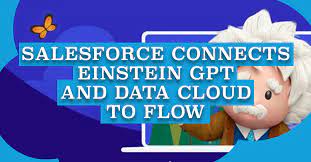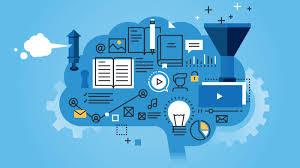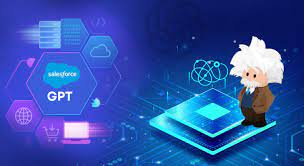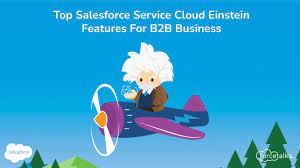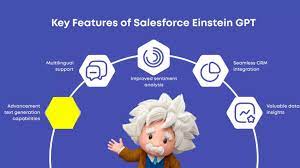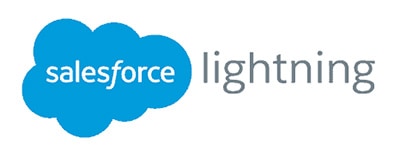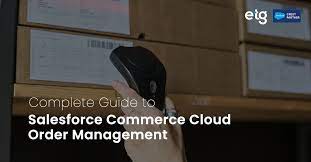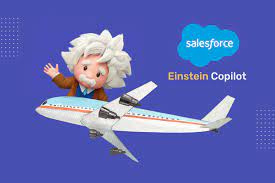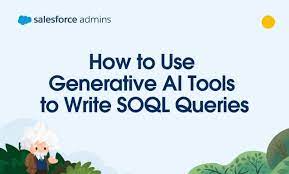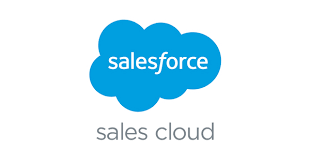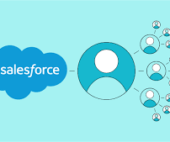Einstein GPT Links to Flow and Data Cloud
Salesforce Harnesses AI and Data Integration to Drive Autonomous, Intelligent Enterprise-Einstein GPT Links to Flow and Data Cloud Salesforce is forging ahead with innovative advancements, seamlessly integrating Einstein GPT and Data Cloud into Flow to propel the autonomous, intelligent enterprise. This article explores how these technologies collaborate to enhance customer experiences and streamline business operations. Einstein GPT Links to Flow and Data Cloud for Intelligent Enterprise Einstein GPT, Salesforce’s groundbreaking generative AI CRM technology, merges proprietary AI models with cutting-edge generative AI from diverse partners, alongside real-time data from the Salesforce Data Cloud. With Einstein GPT, users can leverage this data within their Salesforce CRM to generate adaptive content using natural-language prompts, responding dynamically to evolving customer information and preferences. The Data Cloud consolidates a company’s customer data from various channels into a unified, real-time customer profile. By empowering Flow with the Data Cloud, customers can automate intricate workflows triggered by real-time changes. Flow paired with Einstein GPT offers a conversational interface for creating and adjusting automation, significantly simplifying the process and reducing barriers for non-technical users. Einstein GPT Across Sales, Service, Marketing, and Development Salesforce introduces Einstein GPT across Sales, Service, Marketing, and Development to automate tasks such as composing emails, scheduling meetings, generating knowledge articles from case notes, and crafting personalized content across multiple platforms. Developers benefit from enhanced productivity with AI-driven code generation and assistance using Salesforce Research’s language model. By combining Einstein AI models with ChatGPT or similar models, customers can use natural-language prompts on CRM data to trigger powerful automation and generate personalized content efficiently. Generative AI Fund Salesforce Ventures launches a $250 million Generative AI Fund to invest in promising startups, bolster the startup ecosystem, and advance responsible and trusted generative AI technologies. Real-World Applications Flow, empowered by the Data Cloud, enables businesses to personalize every interaction. For instance, marketers optimize retail experiences with real-time data-driven automation for in-store discounts, while financial services automate fraud detection by flagging suspicious transactions. Manufacturing companies enhance efficiency by monitoring machine performance and automating maintenance requests based on real-time data. Einstein GPT Links to Flow and Data Cloud Real-time automation transforms energy solution commissioning. Salesforce automation streamlines energy production snapshots and system registration for incentives, enhancing operational efficiency and ensuring customer satisfaction. Salesforce is leading the charge in revolutionizing AI-driven content and real-time data integration to automate workflows and deliver personalized customer experiences. The integration of Einstein GPT and Data Cloud into Flow simplifies automation creation and fosters accessibility for all users. With the launch of Einstein GPT for diverse business functions and the Generative AI Fund, Salesforce demonstrates its commitment to responsible, trusted, and innovative AI solutions. Across industries, Salesforce is paving the way for a future powered by autonomous, intelligent enterprises. Like1 Related Posts Salesforce OEM AppExchange Expanding its reach beyond CRM, Salesforce.com has launched a new service called AppExchange OEM Edition, aimed at non-CRM service providers. Read more The Salesforce Story In Marc Benioff’s own words How did salesforce.com grow from a start up in a rented apartment into the world’s Read more Salesforce Jigsaw Salesforce.com, a prominent figure in cloud computing, has finalized a deal to acquire Jigsaw, a wiki-style business contact database, for Read more Service Cloud with AI-Driven Intelligence Salesforce Enhances Service Cloud with AI-Driven Intelligence Engine Data science and analytics are rapidly becoming standard features in enterprise applications, Read more

